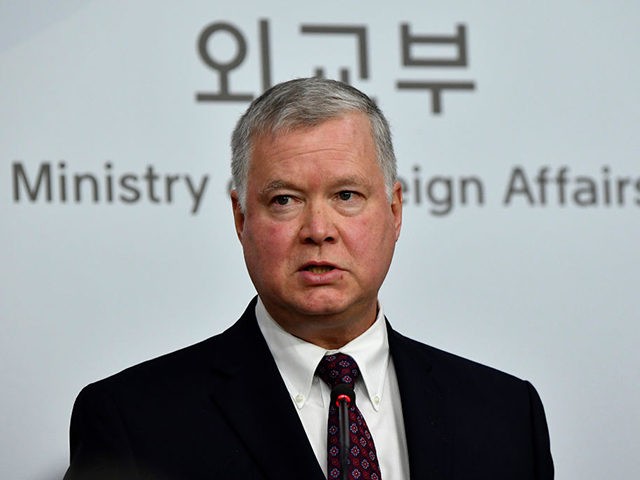Representatives from China and Russia urged the United Nations Security Council on Monday to lift sanctions on North Korea imposed in the aftermath of its last nuclear weapons test in 2017, failing to convince their American counterpart to support the move.
The global sanctions are the strictest imposed on a government multilaterally in the history of the Security Council and are believed to have significantly crippled the North Korean economy. Pyongyang has not tested a nuclear weapon since the sanctions were imposed.
The plea from Russia and China — both accused of violating the sanctions — follows a pattern of increased belligerence towards the United States from the repressive communist regime. In the past month, North Korean officials and state media have demanded the execution of Democrat presidential candidate Joe Biden, called President Donald Trump a “dotard,” and ominously promised Washington a “Christmas present” whose quality only America had the power to choose.
According to Reuters, Russia and China urged the Security Council to allow North Korea to export statues, seafood, and textiles, which would greatly enrich the communist regime. They also suggested allowing foreign countries to more easily hire North Korean workers. North Korea strictly controls movement into and out of the country — and, using a caste system known as “songbun,” within its borders, as well — and vets foreign workers for loyalty to the Kim dynasty and ideological purity before allowing them to work abroad.
Reuters claimed to have been privy to a copy of a proposed U.N. resolution with the provisions detailed within, put forth by Russia and China.
“China hopes the U.N. Security Council forms a consensus on the draft resolution, Foreign Ministry spokesman Geng Shuang said on Tuesday, urging North Korean and the United States to keep talking,” Reuters added.
In response to the report, an unnamed American State Department spokesperson said that Washington opposed lifting sanctions at a moment in which Pyongyang is actively exacerbating tensions.
“Now is not the time for the UN Security Council to consider offering premature sanctions relief,” the spokesperson reportedly said in a response to South Korea’s Yonhap news agency, relayed by Iran’s pro-regime Tasnim agency. “The DPRK [North Korea] is threatening to conduct an escalated provocation, refusing to meet to discuss denuclearization, and continuing to maintain and advance its prohibited weapons of mass destruction and ballistic missile programs.”
“Members of the UN Security Council have spoken in unison that the DPRK must avoid provocations, abide by its obligations under UN Security Council Resolutions, and engage in sustained and substantive negotiations to achieve complete denuclearization,” the spokesperson’s statement reportedly continued.
America’s special representative on North Korea matters, Stephen Biegun, also dismissed the possibility of supporting an end to sanctions without significant action on Pyongyang’s part.
“We are fully aware of the strong potential for North Korea to conduct major provocations in the days ahead,” Biegun said on Monday from South Korea. “To say the least, such an action will be most unhelpful in achieving the lasting peace on the Korean Peninsula.”
Biegun emphasized that North Korea still has time to “choose a better path.”
Trump addressed the potential of further illegal North Korean weapons development on Friday before the sanctions proposal became public through Reuters. He expressed little concern.
“I’d be disappointed if something would be in the works, and if it is, we’ll take care of it,” Trump told reporters. “We’re watching it very closely.”
South Korea confirmed that talks to ease sanctions at the United Nations were ongoing and that Seoul is involved in the talks.
“While closely communicating with key Security Council member countries, we are keeping a watch on related matters,” South Korea Foreign Ministry spokesman Kim In-chul said on Tuesday, according to Yonhap. “At this point, what matters most is making substantive progress in efforts for the complete denuclearization of the peninsula and the establishment of a lasting peace through the resumption of working-level talks between the U.S. and the North.”
China and Russia signed on to the 2017 Security Council sanctions after North Korea declared it had successfully tested a sixth nuclear weapon, causing significant seismic activity near the border with China and fueling reports that North Korean scientists had clumsily hollowed out Mount Mantap, the test site. In part due to concerns that more risky nuclear tests could shower China with toxic nuclear fumes, Beijing supported limited international sanctions on Pyongyang. North Korea replied by referring to China as a “U.S. vassal force” and calling the sanctions an “act of war,” but never followed up on those words with military action. By the next year, dictator Kim Jong-un would visit China three times.
While the move to lift Security Council sanctions failed, Yonhap reported on Tuesday that UNICEF has received permission to ship humanitarian aid to North Korean children. The aid covered by the exception totals $3 million, much of it in clean water and supplies to ensure that children maintain clean hygiene.

COMMENTS
Please let us know if you're having issues with commenting.